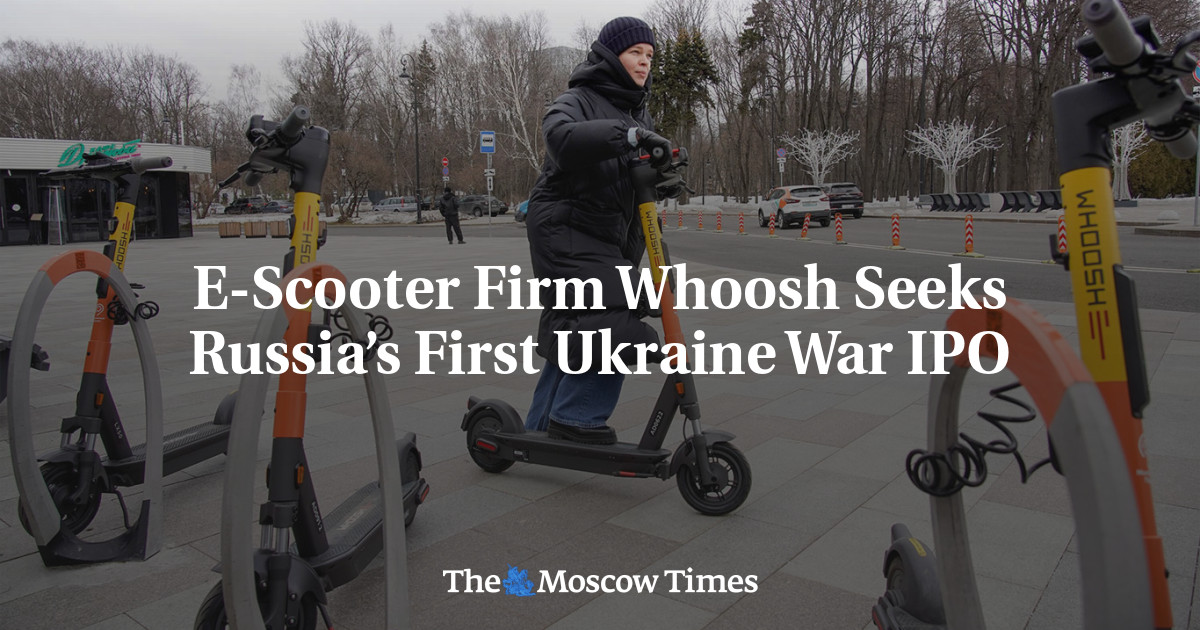
Russian E-scooter firm Whoosh’s plans for an initial public offering (IPO) this week — the first since Russia’s invasion of Ukraine — will be a test of the country’s battered capital markets after nearly 10 months of Western sanctions, analysts said.
If successful, Whoosh is due to begin trading on the Moscow Exchange on Wednesday.
“It is important that at least one IPO is taking place this year in these difficult market conditions,” said Sergei Suverov, an investment strategist at Aricapital Asset Management.
Before the invasion of Ukraine, at least 10 Russian companies were reportedly seeking IPOs in 2022, but the war and Western sanctions destroyed these plans as foreign investors fled, international companies exited and Russia’s stock market capitalization fell over 40%.
In the absence of foreign capital — which traditionally played a significant role in Russian IPOs — Whoosh will be counting solely on Russian money.
The IPO is expected to be worth 2.3 billion rubles ($36.3 million) giving Whoosh a market capitalization of 20.6 billion rubles, the company said in a statement Monday.
The launch price is 185 rubles per share.
This is significantly lower than the company’s target of selling 5 billion rubles worth of shares set earlier this month.
“We are sure that the proposed IPO price will… enable us to attract first-class Russian funds into the company’s capital,” Whoosh CEO Dmitry Chuyko said in the Monday statement.
“We consider our entering the equity capital market as a strategic priority for our business, which will provide the company with additional flexibility and new opportunities.”
Woosh, which was set up in 2019, operates in about 40 locations in Russia and former Soviet countries and registered 46.6 million rides on its e-scooters in the first nine months of this year.
Revenue in the same period increased 70% to 6.3 billion rubles.
“All scooter businesses are trendy so they are growing rapidly,” said Anatoly Levenchuk, scientific director at Moscow’s Systems Management School, referring to the growing popularity of e-scooters in major Russian cities like Moscow.
“Listing on the stock exchange is the right thing to do.”
While Whoosh’s Russian IPO — if successful — will be the first since the start of the Ukraine war, Russian cybersecurity firm Positive Technologies held a secondary public offering in September.
While some analysts believe that other companies, which had shelved their listing plans after the invasion, may return to them following Whoosh’s success, there is little chance of a rush of IPOs.
“I don’t think the Russian market should expect large IPO listings,” Suverov told The Moscow Times, though he said “second-tier stocks listings” were “possible.”
Nor should Whoosh’s listing lead to any over-optimistic assessments about the state of the Russian economy after almost 10 months of fighting in Ukraine.
“Any IPO listing is a good sign,” said Sergei Khestanov, macroeconomics adviser at Moscow-based brokerage Otkritie.
“But the size of the company and its specifics don’t allow us to draw any conclusions about Russia’s economy.”